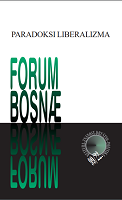ANTINOMIES OF LIBERALISM: ON PLURALISM, TOLERATION, CIVIL DISOBEDIENCE, AND SACRIFICE
ANTINOMIES OF LIBERALISM: ON PLURALISM, TOLERATION, CIVIL DISOBEDIENCE, AND SACRIFICE
Author(s): Desmond MaurerSubject(s): Political Philosophy, Social Philosophy, Political history, Social history, Contemporary Philosophy, Government/Political systems, Political behavior, Politics and society, Social Theory, Sociology of Politics
Published by: Međunarodni forum Bosna
Keywords: liberalism; post-liberalism; individuality; autonomy; individualism;
Summary/Abstract: The question of liberalism has become a vexed one over recent decades, with many contemporary theorists preferring to opt for some form of what they term post-liberalism, marking in this way the insoluble nature of the internal contradictions of the liberal stance in a post-modern, post-naïve, but also post-cynical, and fundamentally reflexive age – an age of complexity. The ideals of individualism and autonomy seem naïve and ideological, as everything resolves into connectivity and relatedness and theories take on the aspect of narratives of emergence. The concept of the individual once referred to monadic being, being that could not be divided further (this is the literal meaning of atom, while monad comes from the Greek monas, which means one or unitary). As the eighteenth and nineteenth centuries transitioned from a metaphorology based upon the breath of life to one based upon masks, roles, and performativity, however, the term “individual” came to be used for the soul after it had undergone processes of de-transcendentalisation and introjective internalization (immanentization). The individual was transposed from an essentially homogeneous unit of the shared substrate common to each and every human being, the spark of the divine within us, into the infinite, infinitely valuable, and unique person (literally the theatrical mask through which the voice resonates, the persona). The individual thus became a unique source of action based upon the idea of personhood and subjectivity, as crystallised in the concept of autonomy or self-determination. There is, however, necessarily an infinite number of such unique sources, themselves overdetermined by structures of external influence or heteronomies, mediated through webs of intersubjective intentionality and semiotic structuration. These structuring structures are not externally existing realities, but an implied hinterland of acts of semiosis that are themselves dependent on external symbolic anchors, which act as intersubjective foci for the coordination of meaning. Each of these imaginary complexes is fundamentally incoherent, based upon complex and cross-cutting metaphorologies and each of them is constantly being shored up against collapse back into the imaginary soup from which they have been raised. The figures (metaphorical complexes) that emerge take on a claim to individuality and autonomy through self-differentiation from their context – they become systemically distinct for a while. The appearance of individuality and autonomy are thus fragile achievements that depend on systemic features, which give them substance but are always subject to deformation, the laws of unintended consequence and perverse effects, and so to collapsing under their weight. These are the constitutive antinomies of Liberalism. In what follows, we will look at some of the implications of this claim.
Journal: Forum Bosnae
- Issue Year: 2022
- Issue No: 99
- Page Range: 17-86
- Page Count: 70
- Language: English
- Content File-PDF

